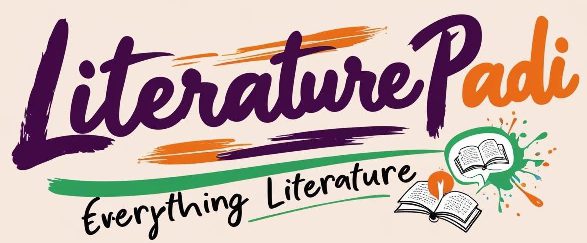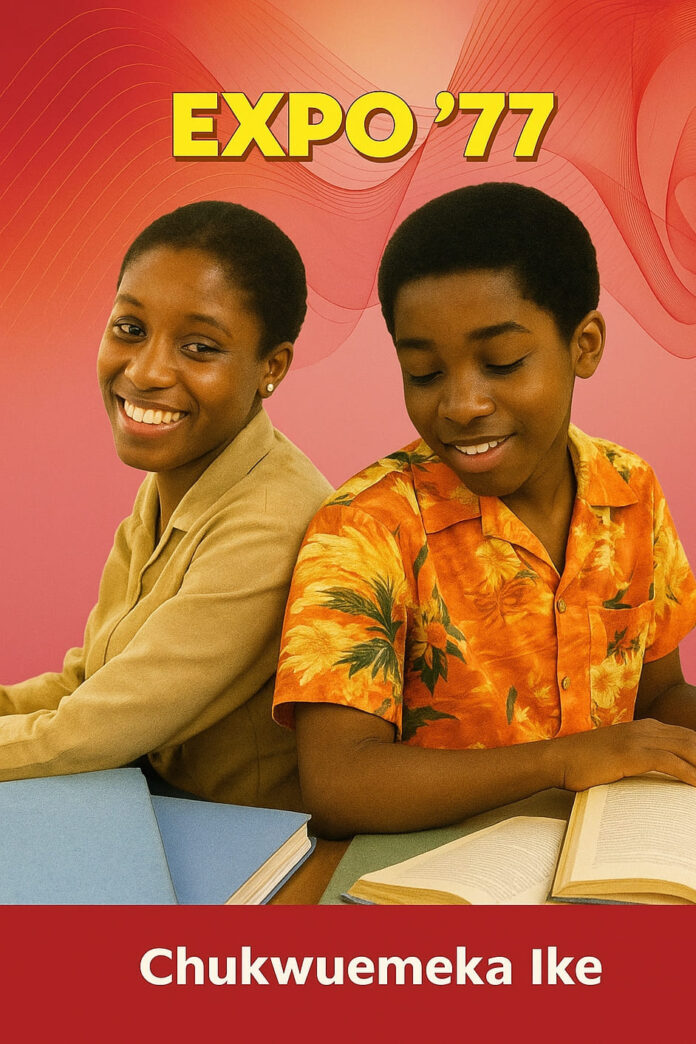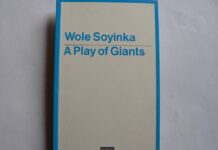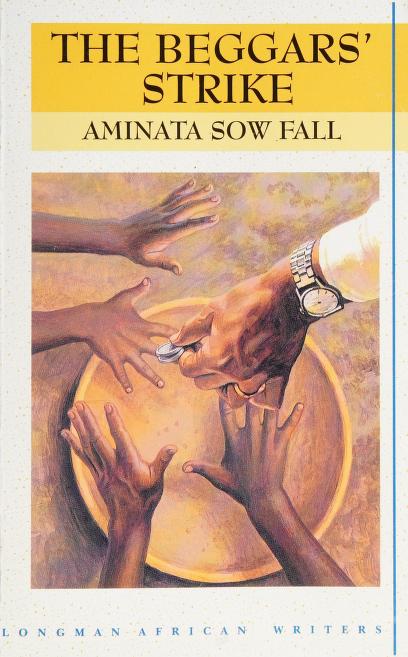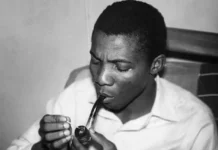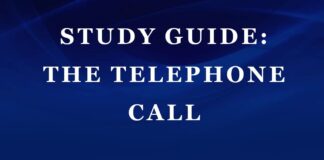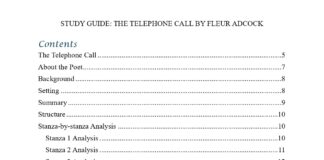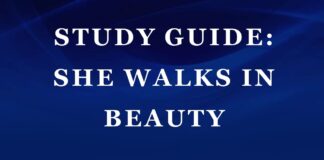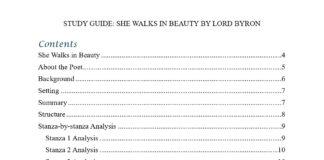Quality UTME Lessons for Art Students
Individual and group classes • Student-friendly rates
📞 Contact Ayomiposi on WhatsApp now
🎥 We’re cooking something delicious for you on our YouTube channel. In the coming days, you will learn SSCE literature texts like you're in class 📚✍🏽
Be part of this new journey we are about to embark on.
🔔 Subscribe Now
Expo ’77 by Chukwuemeka Ike is a gripping investigative novel that explores the rampant examination malpractice that plagued the Certificate of Secondary Education (CSE) exams.
Set against the backdrop of Nigeria’s education system in the 1970s, the novel is largely inspired by the infamous 1977 West African School Certificate (WASC) examination leak, which took place during Ike’s tenure at the West African Examinations Council (WAEC).
Chukwuemeka Ike uses fiction to dramatise this anomaly and expose the organised criminal networks behind question paper leaks.
Expo ’77 critiques a failing system that encourages dishonesty and rewards shortcuts.
Plot Summary of Expo ’77
The novel opens with widespread panic within the National Education Board (NEB), the body overseeing the CSE exams. Anonymous calls, petitions, and letters confirm what officials dread: the current exam cycle has been compromised.
Although the exam body has deployed expensive and seemingly impenetrable security measures, exam questions continue to leak to candidates across major Nigerian cities—Lagos, Benin City, Onitsha, Aba, Owerri, and Enugu.
This leak culture, known locally as “expo,” becomes so pervasive that students stop studying entirely, and begin to rely instead on leaked questions and model answers.
A key example is Comfort, a student who cannot understand her Bible Knowledge syllabus and pins all her hopes on buying the leaked papers. Her character shows the psychological and academic damage caused by exam leaks. She represents a generation conditioned to depend on fraudulent means to succeed.
In response to the crisis, the NEB hires Mr. Mora, a former police officer turned private detective and now the head of a firm called Tutuntu and Company. Mora and his team are tasked with infiltrating and exposing the elusive syndicates responsible for the leaks.
What follows is a tense and fascinating investigation into a shadowy world of crime, bribery, spiritual deception, and betrayal.
Mora’s team uncovers how these syndicates operate: armed night raids at the homes of question reviewers, threats against their families, and collusion with house staff to leave windows unlatched for easy access.
Victims are forced at gunpoint to dictate exam questions under duress, warned that they and their families would be killed if the information turned out to be false or if they reported the incident.
One of Mora’s agents, Koko, discovers a syndicate operating under the guise of a hospital. Located in Apapa, the operation mimics a traditional healing centre. Here, candidates seeking “help” for exams must drop their payment into an enamel bowl and proceed to a “prescription room,” where a “doctor” enters a trance and produces “miraculous” exam papers. These papers appear blank until they are held over heat, revealing the questions. The entire setup is a disturbing blend of mysticism and organised crime, complete with religious robes and herbalist incantations used to create an illusion of divine guidance.
As Mora’s investigation deepens, more conspirators are revealed. These include seminarians, herbalists, school administrators, and even NEB insiders such as Dapri, an official from Rivers State. These discoveries show just how deeply entrenched corruption is, cutting across professions and moral institutions alike.
In classic Ike fashion, the novel closes with constructive recommendations. Through Dr. Buka, the acting Registrar of the NEB, Ike outlines a reform plan to combat future leaks. He suggests eliminating school-based examination centres, establishing centralised urban centres, and handling question paper distribution from a central location just as newspapers are efficiently distributed nationwide every day. This would drastically reduce the window for leaks and improve exam integrity.
In short, Expo ’77 offers a thrilling but sobering look at the decay of educational values, the greed of individuals who profit from fraud, and the need for systemic change. It’s a novel that remains deeply relevant in today’s education landscape.
Related: A Review of Chukwuemeka Ike’s EXPO ’77
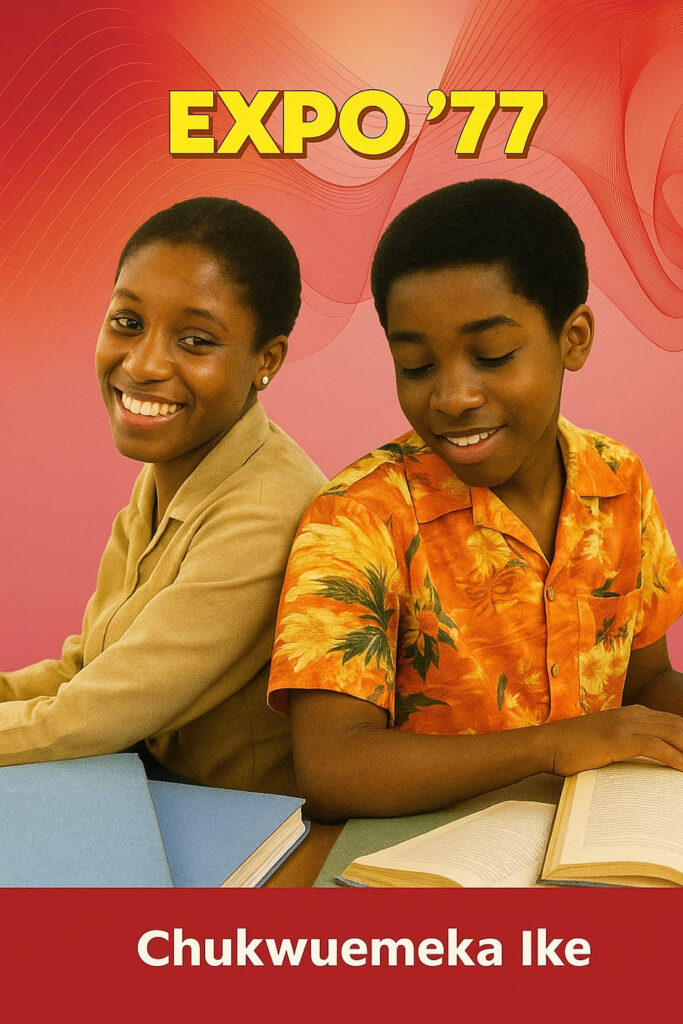
Character Analysis of Expo ’77
Chukwuemeka Ike populates Expo ’77 with a cast of characters who represent different facets of Nigeria’s examination crisis in the 1970s. There are determined investigators, desperate students, morally compromised officials, and spiritual fraudsters all in one text. Some of the important characters in the novel are Mr. Mora, Dr. Buka, Comfort, and Koko.
Mr. Mora: He stands as the central force for justice in Expo ’77. Mr. Mora is a retired police officer turned private investigator, recruited by the National Education Board (NEB) to uncover the syndicates behind the massive examination leak. Now heading a detective firm called Tutuntu and Company, Mora brings both experience and strategy to the investigation. He is calm, methodical, and unafraid to confront the dark and dangerous operations of criminal networks.
Mora’s effectiveness lies in his ability to work underground, infiltrate syndicates, and use logical deduction to trace how question papers are stolen. Through Mora, the novel shifts into a thrilling detective genre, as readers follow his efforts to expose not just street vendors, but also the powerful “Ogas” running the operation. His investigation helps the NEB understand the scale of the rot.
Dr. Buka: Dr. Buka is the Acting Registrar of the National Education Board and the official most troubled by the crisis. From the beginning of the story, he is seen struggling under the weight of responsibility. The anonymous calls and evidence of malpractice keep piling up, despite the NEB’s costly security efforts. Buka represents the bureaucratic face of the examination system, one that is reactive, overwhelmed, and desperate for a solution.
While he is not directly involved in the investigation, his eventual openness to Mora’s findings and his willingness to adopt bold reforms at the end of the novel mark a turning point. He proposes the radical idea of abolishing school-based centres, centralising exam distribution, and drawing inspiration from how national newspapers are delivered daily.
Comfort: She is a symbolic character who reflects the mindset of the average examination candidate caught in the web of malpractice. She is academically weak and unable to grasp her Bible Knowledge syllabus. Instead of studying, she relies entirely on her ability to purchase both leaked questions and model answers.Her character shows how “expo” culture fosters laziness, destroys academic integrity, and builds false confidence in students.
Comfort’s situation is not unique. She is portrayed as just one of many across Nigerian cities like Lagos, Benin, and Onitsha.
Koko: He is one of Mr. Mora’s detectives. He plays a crucial role in the success of the investigation. He is daring, intelligent, and resourceful. Koko goes deep into the heart of the syndicates, uncovering the individuals involved, and their intricate techniques and coded language. His journey takes him from Agege to Apapa, where he discovers a syndicate disguised as a hospital.
This “hospital” is a front for spiritual deception, where candidates pay for “drugs” (leaked questions) and enter a “prescription room” where a fake doctor conjures questions through supposed visions. The clever use of heat to reveal invisible ink on blank paper adds a layer of mystical illusion to the fraud.
Koko’s findings emphasise how these criminals blend cultural beliefs with deception to manipulate desperate candidates.
Dapri: Dapri is a Rivers State examination official. He is exposed as one of the insiders aiding the criminals. His involvement showcases the internal rot within the NEB and the dangerous collusion between those who should protect the system and those who exploit it.
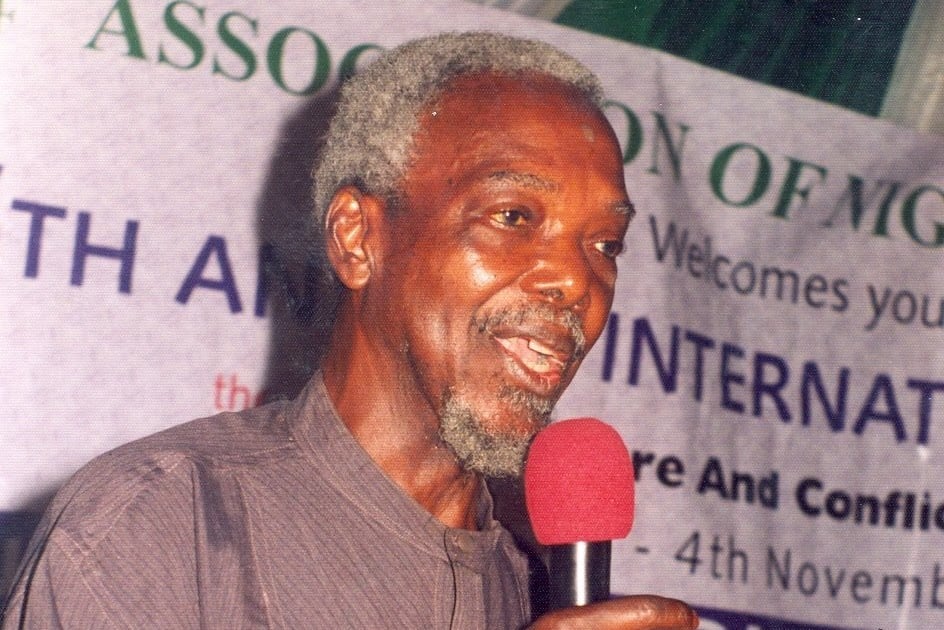
Themes in Expo ’77 by Chukwuemeka Ike
Expo ’77 is a profound commentary on Nigerian society, ethics, education, and reform. The novel explores such themes as examination malpractice, moral decay, investigative justice, deception, and institutional failure.
Theme of Examination Malpractice
Theme of examination malpractice is the pervasive theme in Expo ’77. Ike draws inspiration from the real-life 1977 Secondary School Certificate exam paper leak in Nigeria. The term “expo” in the novel refers to students having foreknowledge of examination questions. This act has become so normalised that there is a whole language around it: “Sure banker,” “this one na proper one,” and “no be panya.”
Ike does not treat malpractice as an isolated act by students but as a widespread, organised crime involving powerful syndicates. These groups include vendors, school administrators, religious figures, and even some employees of the National Education Board.
The novel reveals the violent and deceptive means by which these groups access and distribute leaked papers through detailed accounts like the armed break-ins into teachers’ homes and the spiritual-fraud hospital in Apapa.
Theme of Moral Decay
Closely tied to the theme of malpractice is the moral decay among students and adults alike. The character Comfort is a prime example of a student who has surrendered all hope of personal academic effort. She is unable to understand the Bible Knowledge syllabus and instead puts all her trust in buying both questions and model answers. This dependence reveals how easily students can lose the value of hard work when shortcuts are readily available.
On a broader level, the novel suggests that when systems reward cheating, honesty and diligence are seen as foolishness. The normalisation of “expo” among students and the complicity of school authorities, religious figures, and public servants underscore the erosion of values in both education and society at large.
Theme of Investigative Justice
Ike uses the character of Mr. Mora and his detective agency to explore the possibility of justice in a deeply corrupt system. Mora is a former police officer turned private investigator, whose mission is to trace the source of the leaks. His methods (surveillance, infiltration, and critical thinking) allow the story to shift into detective fiction in which there is hope that the truth will be uncovered.
Koko, Mora’s field detective, exemplifies the bravery needed to challenge powerful criminal networks. He discovers the syndicates’ disguise in Apapa, where leaked questions are obtained through fake spiritual visions. Their ability to operate in such an elaborate and theatrical manner reveals both the depth of the fraud and the importance of investigative courage in exposing it.
Theme of Deception
One of the most striking examples of deception in Expo ’77 is the syndicate’s use of religious theatrics to sell exam questions. In a fake hospital run by spiritual con artists, candidates are made to believe that leaked questions are “seen in visions.” The conman doctor enters a trance, and a blank sheet of paper miraculously drops to the floor, only for the text to be revealed with heat.
This scene depicts how fraudsters manipulate traditional and religious beliefs to exploit desperate candidates.
Ike critiques how even sacred institutions can be weaponised for criminal activity, suggesting that no part of society is immune from corruption.
Literary Devices in Expo ’77
Satire: One of the most prominent literary devices in Expo ’77 is satire. Ike uses humour, exaggeration, and irony to mock and criticise the moral decay in the education system. The elaborate operations of the syndicates such as the fake spiritual hospital are both absurd and hilarious, yet deeply troubling. This satirical element exposes the ridiculous lengths people go to cheat.
Irony: Ike makes use of irony in the novel. This is demonstrated by the fact that the culpable school heads, religious figures, and even officials of the National Education Board are the same people entrusted with upholding academic standards. They are supposed to be role models, but they are secretly facilitating malpractice.
Symbolism: The author uses symbolism throughout the novel. We can pick a few of them from the fake hospital mentioned in the foregoing sections. There is, for example, the “prescription room” which is a symbol of how deeply rooted the fraud has become. It disguises exam malpractice as a legitimate medical or spiritual service. In the same vein, “drugs” represent leaked question papers, suggesting that malpractice has become an addiction or “cure” for students’ academic struggles (depending on which way you choose to see it).
Imagery: Vivid imagery brings the settings and events of Expo ’77 to life, making the reader feel the tension and corruption firsthand. Ike describes scenes in a way that appeals to the senses. Below is a disturbing image of home invasion that creates a strong emotional reaction and reveals how far the criminals are willing to go in the novel:
‘Our BK teacher is the Reviser for NEB,’ Olusegun admitted. ‘He’s an Indian and, you know, these Indians, you can’t always be sure whether they’ll co-operate. I served on the task force for BK. At first, we thought of issuing an anonymous letter to him, pretending that it came from an underground organisation threatening to wipe out his entire family unless he dropped an envelope containing the questions coming in BK at given location within a given period.’
‘You think you could have pulled that off without being locked up at Kirikiri?’ Jibril cut in.
‘We feared it won’t work so we organised a midnight raid on his house instead. We got boys from another school to do the interrogation during the raid, so that he couldn’t recognise any voices. We didn’t know armed robbery was so easy.’
‘You frighten me!’ Comfort shuddered.
‘One boy found out that the man’s steward hated him, so we paid the steward ten Naira to keep the window into the toilet unbolted when they retired for the night. One of the boys got in from there and opened the main door for the three others. We had also learnt from the steward that the man always left his bedroom door unlocked at night to enable his children to reach him at any time.
‘The boys quietly opened the bedroom door, wearing Batman masks; one boy grabbed the teacher, and another his tiny wife…’
Comfort screwed her face and clasped her arms tight across her chest as if a TV set in front of her was about to show condemned armed robbers absorbing a volley of bullets at the Lagos bar beach.
‘The teacher was asked to stay where he was — on his bed — and dictate ten topics which would come in each of the BK papers. If he failed to begin after the count of ten, he would hear the pistol pointed at his wife’s brain go off first.’
‘Chei!’ Comfort shrieked.
‘Then the order would be given to the marksmen in the other two rooms to eliminate his three children. And then he would accompany them! Before the leader of the operation could count two, the frightened teacher had begun to dictate the questions…’
‘That was fantastic,’ Jibril applauded.
‘The operation was over in five minutes. The teacher was warned that if the questions turned out to be false, he and his family would be eliminated. He was also warned not to mention the incident to anybody. As soon as the boys came out, we paid them fifty Naira each for the operation, made copies of the questions and agreed on how to sell them to recover the money we spent. Before six this evening, we had collected five hundred Naira, which leaves us plenty to plan our next operation!’
Suspense: Ike builds suspense through the detective work of Mr. Mora and his team. As they trace clues, infiltrate syndicates, and follow leads from Lagos to Apapa and across the country, readers are kept in a state of anticipation.
Omniscient Narration: The story is told through an omniscient third-person narrator, who knows the thoughts and motives of all characters.
Final Words
Expo ’77 is both a gripping detective story and a wake-up call. Ike’s final recommendations, voiced through Dr. Buka, challenge education authorities to reform examination practices and restore credibility to academic assessment. For students reading this novel today, it is a reminder that honesty, hard work, and ethical behaviour remain the true paths to success, no matter how tempting the “expo” might seem.
Receive Literary Updates through our Social Media Channels:
- WhatsApp: Literature PADI
- Telegram: Literature PADI
- YouTube: @literaturepadi
- Facebook: Literature PADI
